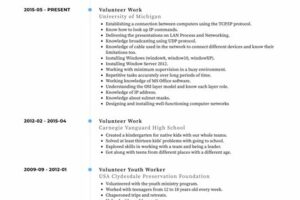Table of Contents
Learn how to effectively manage a volunteer program with our comprehensive guide. Discover essential strategies and techniques for recruiting, training, and retaining volunteers. Enhance your leadership skills and create a positive volunteer experience by implementing best practices in communication, motivation, and recognition. Streamline your program’s operations and maximize the impact of your volunteers with expert tips and advice.
Managing a volunteer program can be a rewarding yet challenging endeavor. Whether you are a seasoned professional or a beginner in the world of volunteer management, it is crucial to establish a solid foundation for success. With the right strategies and a clear vision, you can create a program that not only attracts dedicated volunteers but also maximizes their impact. In this article, we will explore the key steps and best practices to effectively manage a volunteer program, from recruitment and training to recognition and retention. So, let’s dive in and discover how you can lead an exceptional volunteer team!
Introduction
In today’s world, volunteering is a crucial aspect of creating positive change in society. Volunteer programs play a significant role in addressing various social issues and providing support to those in need. However, managing a volunteer program can be a challenging task that requires careful planning, organization, and effective communication. This article will provide you with essential tips and strategies on how to successfully manage a volunteer program.
1. Clearly Define Goals and Objectives
Before launching a volunteer program, it is essential to define clear goals and objectives that align with your organization’s mission and values. This will help volunteers understand the purpose of their involvement and ensure everyone works towards a common goal. By setting specific and measurable objectives, you can track progress and assess the program’s impact.
2. Recruit and Select Volunteers
Your volunteer program’s success relies heavily on recruiting and selecting the right individuals for each position. Develop an application process that allows you to assess candidates’ skills, experiences, and motivations. Conduct interviews or group discussions to get to know potential volunteers better and determine if they are a good fit for your program.
3. Provide Adequate Training
Once volunteers are selected, it is crucial to provide them with comprehensive training that equips them with the necessary knowledge and skills to perform their tasks effectively. Training sessions should cover topics such as the organization’s mission, the specific roles and responsibilities of each volunteer, and any relevant policies or procedures.
4. Establish Clear Communication Channels
Effective communication is key to managing a volunteer program successfully. Establish clear channels of communication, such as regular team meetings, email updates, or a dedicated online platform, to ensure volunteers stay informed and engaged. Encourage open dialogue, provide feedback regularly, and address any concerns or questions promptly.
5. Create a Supportive Environment
Volunteers are more likely to remain engaged and committed if they feel supported and valued. Foster a supportive environment by recognizing and appreciating volunteers’ contributions, providing opportunities for personal and professional growth, and addressing any issues or conflicts that may arise promptly and fairly.
6. Delegate Responsibilities Effectively
As a volunteer program manager, it is essential to delegate responsibilities effectively to ensure tasks are distributed evenly and everyone has a role to play. Identify volunteers’ strengths and interests and assign them tasks accordingly. This will not only maximize efficiency but also enhance volunteers’ sense of ownership and satisfaction.
7. Implement an Evaluation and Feedback System
Regular evaluation and feedback are critical for the continuous improvement of your volunteer program. Develop a system to assess volunteers’ performance, gather their feedback on the program’s effectiveness, and make necessary adjustments based on the collected data. This will help you identify areas of improvement and ensure the program remains impactful and engaging.
8. Recognize and Celebrate Achievements
Recognizing and celebrating volunteers’ achievements is an essential part of managing a volunteer program. Acknowledge their efforts and accomplishments through various means such as public recognition, certificates, or volunteer appreciation events. This not only boosts morale but also encourages volunteers to continue making a difference.
9. Build Relationships with Volunteers
Building strong relationships with your volunteers is crucial for their long-term commitment and engagement. Take the time to get to know them individually, understand their motivations, and provide opportunities for social interactions and team-building activities. Regularly check in with volunteers and show genuine interest in their well-being.
10. Continuously Improve and Adapt
A successful volunteer program is one that continuously evolves and adapts to changing circumstances. Regularly seek feedback from volunteers, assess the program’s impact, and identify areas for improvement. Stay informed about emerging trends and best practices in volunteer management to ensure your program remains effective and relevant.
Conclusion
Managing a volunteer program requires careful planning, effective communication, and continuous evaluation. By clearly defining goals, recruiting the right volunteers, providing adequate training, and fostering a supportive environment, you can create a successful and impactful volunteer program. Remember to recognize volunteers’ achievements, build strong relationships, and continuously adapt your program to ensure its long-term success. Together, we can make a positive difference in our communities.
How to Manage a Volunteer Program
A successful volunteer program requires careful planning, effective communication, and ongoing support. By following a comprehensive approach that encompasses recruitment, onboarding, communication, training, task assignment, recognition, community-building, and evaluation, organizations can create a thriving volunteer program that maximizes impact and engagement.
Developing a Comprehensive Volunteer Recruitment Strategy
The first step in managing a volunteer program is developing a comprehensive recruitment strategy. This strategy should clearly outline the target audience, desired skills and qualifications, and methods for attracting potential volunteers. By understanding the specific needs of your organization and identifying the qualities you seek in volunteers, you can effectively recruit individuals who are passionate about your cause and can contribute meaningfully to your program.
Structuring a Clear Volunteer Onboarding Process
Once volunteers are recruited, it is essential to have a structured onboarding process in place. This process helps volunteers understand their roles and responsibilities, provides necessary training and orientation, and familiarizes them with the organization’s values and culture. A well-designed onboarding process ensures that volunteers feel supported and prepared to make a positive impact from the start, leading to higher levels of engagement and retention.
Establishing Effective Communication Channels
Effective communication is vital for managing a successful volunteer program. Establish clear lines of communication through regular updates, newsletters, and volunteer meetings to provide volunteers with the information they need to carry out their tasks effectively. Additionally, having an open-door policy and encouraging two-way communication can help address any concerns, suggestions, or feedback from volunteers, leading to improved satisfaction and overall program success.
Providing Ongoing Training and Development Opportunities
Continuous learning and development opportunities enhance volunteers’ skills and abilities while contributing to their sense of personal growth and fulfillment. Offer relevant training sessions, workshops, and resources to equip volunteers with the necessary tools to excel in their roles. This demonstrates your organization’s commitment to their professional development, increasing their motivation and dedication.
Assigning Meaningful and Impactful Assignments
To ensure volunteers remain engaged and dedicated, it is crucial to assign them meaningful tasks that align with their skills, interests, and motivations. Carefully match their abilities with the specific needs of your organization, providing them with opportunities to make a real difference. This approach maximizes their impact and fosters a sense of purpose and satisfaction among volunteers.
Recognizing and Appreciating Volunteer Contributions
Recognizing and appreciating your volunteers’ efforts is key to maintaining their enthusiasm and commitment. Express gratitude through thank-you notes, certificates, or volunteer appreciation events to demonstrate your organization’s recognition of their valuable contributions. Moreover, providing opportunities for volunteers to share their successes and stories can serve as a source of motivation for others, further enhancing their engagement in your program.
Building a Supportive Volunteer Community
Facilitating a sense of belonging and community among your volunteers creates a supportive environment that fosters collaboration and teamwork. Encourage volunteers to connect with one another through social events, online forums, or mentorship programs to build strong relationships and provide a platform for ongoing learning and support. Building a volunteer community also allows for the exchange of ideas and best practices, leading to a more cohesive and impactful program.
Regularly Evaluating and Adapting the Volunteer Program
Continuous evaluation is essential for effective management of a volunteer program. Regularly assess the program’s strengths and weaknesses, collect feedback from volunteers, and monitor outcomes and impact. Use this information to adapt and improve your program, ensuring that it remains relevant, efficient, and aligned with the changing needs of both your organization and volunteers. By regularly reviewing and updating your program, you can maintain its success and maximize the benefits for all involved.
In conclusion, managing a volunteer program requires careful planning and implementation of various strategies to recruit, onboard, communicate with, train, assign tasks to, recognize, build a community among, and evaluate volunteers. By following these guidelines and utilizing effective management techniques, organizations can create a thriving volunteer program that not only benefits the organization but also provides volunteers with meaningful experiences and opportunities for personal growth.
In managing a volunteer program, it is essential to adopt a professional voice and tone to effectively communicate expectations, objectives, and guidelines. By using clear and concise language, volunteers will understand their roles and responsibilities, fostering a productive and positive atmosphere within the program.
Here are some key points to consider when managing a volunteer program:
- Create a comprehensive volunteer handbook:
- Outline the mission, vision, and values of the organization to provide volunteers with a clear understanding of its purpose.
- Include information on policies, procedures, and code of conduct to ensure a professional and respectful environment.
- Provide details about volunteer roles, expectations, and time commitments to establish clear boundaries and avoid misunderstandings.
- Develop an effective communication plan:
- Establish regular channels of communication with volunteers, such as email updates, newsletters, or team meetings, to keep them informed about upcoming events, changes, or training opportunities.
- Encourage open dialogue and feedback by creating a welcoming environment where volunteers feel comfortable expressing their concerns, ideas, and suggestions.
- Respond promptly to volunteer inquiries or issues to demonstrate respect and appreciation for their contributions.
- Provide thorough training and orientation:
- Offer comprehensive training sessions to ensure volunteers possess the necessary skills and knowledge to perform their tasks effectively.
- Present information in a professional and engaging manner, utilizing visual aids, demonstrations, and interactive activities.
- Assign experienced volunteers or staff members as mentors to provide guidance and support to new volunteers during their initial period.
- Recognize and appreciate volunteer efforts:
- Implement a formal recognition program to acknowledge and celebrate the contributions of volunteers.
- Express gratitude through personalized thank-you notes, certificates, or small tokens of appreciation.
- Highlight exceptional volunteers in organizational newsletters, social media posts, or during events to publicly recognize their dedication.
- Evaluate and monitor the program:
- Regularly assess the effectiveness of the volunteer program by collecting feedback from volunteers, staff members, and beneficiaries.
- Use surveys, evaluations, or focus groups to identify areas for improvement and address any concerns promptly.
- Monitor the performance and satisfaction of volunteers to ensure they feel supported and engaged in their roles.
By following these guidelines and maintaining a professional voice and tone throughout the management of a volunteer program, organizations can cultivate a rewarding experience for both volunteers and beneficiaries, ultimately achieving their mission and goals.
Thank you for taking the time to visit our blog and learn about how to manage a volunteer program. Managing a volunteer program can be a rewarding experience, but it also comes with its fair share of challenges. Throughout this article, we have provided you with valuable insights and tips on how to effectively manage your volunteer program to ensure its success. We hope that the information we have shared will be helpful to you as you navigate the world of volunteer management.
First and foremost, it is crucial to establish clear goals and objectives for your volunteer program. By clearly defining what you want to achieve, you can better align your volunteers’ efforts with the overall mission of your organization. This will not only provide your volunteers with a sense of purpose but also ensure that their time and skills are utilized effectively. Additionally, setting specific goals will enable you to measure the impact and success of your volunteer program, allowing you to make any necessary adjustments along the way.
Communication is key when managing a volunteer program. Regularly keeping in touch with your volunteers is essential for maintaining a positive and productive relationship. Utilize various communication channels such as email newsletters, social media groups, or even monthly meetings to keep your volunteers informed about upcoming events, changes in procedures, or any other relevant updates. Furthermore, providing opportunities for feedback and suggestions will make your volunteers feel heard and valued, fostering a sense of community and teamwork.
Lastly, it is important to recognize and appreciate the efforts of your volunteers. Expressing gratitude can go a long way in boosting morale and encouraging continued dedication. Whether it is through a simple thank-you note, a public acknowledgment, or even small tokens of appreciation, acknowledging your volunteers’ contributions will help build a stronger bond between them and your organization. Remember, volunteers often give their time selflessly, and recognizing their efforts will make them feel valued and motivated to continue supporting your cause.
In conclusion, managing a volunteer program requires careful planning, effective communication, and sincere appreciation. By setting clear goals, maintaining open lines of communication, and expressing gratitude, you can create a positive and fulfilling experience for both your volunteers and your organization. We hope that the insights shared in this article will serve as a valuable resource as you navigate the world of volunteer management. Thank you once again for visiting our blog, and we wish you all the best in your volunteer program endeavors.
Video How To Manage A Volunteer Program
1. How do I start a volunteer program?
Starting a volunteer program involves several steps:
- Identify the specific needs of your organization or community that can be fulfilled through volunteers.
- Create a detailed plan outlining the goals, objectives, and activities of the volunteer program.
- Recruit potential volunteers by advertising the program through various channels such as online platforms, social media, or local community centers.
- Screen and select volunteers by conducting interviews or background checks to ensure suitability for the program.
- Provide proper training and orientation to volunteers to familiarize them with their roles and responsibilities.
- Establish an effective communication system to keep volunteers informed and engaged.
- Regularly evaluate and recognize the efforts of volunteers to maintain motivation and retention.
2. How can I manage volunteers effectively?
To manage volunteers effectively, consider the following strategies:
- Clearly define volunteer roles and responsibilities to avoid confusion and ensure each volunteer knows what is expected of them.
- Establish regular communication channels to provide updates, answer questions, and address concerns.
- Provide ongoing support and supervision to volunteers, offering guidance and feedback when needed.
- Create a positive and inclusive volunteer environment by promoting teamwork and recognizing individual contributions.
- Offer opportunities for skill development and personal growth to enhance volunteer engagement.
- Implement an efficient volunteer tracking system to record volunteer hours, tasks completed, and accomplishments.
- Show appreciation and gratitude to volunteers by expressing thanks and recognizing their efforts publicly.
3. How do you motivate volunteers?
To motivate volunteers, consider the following approaches:
- Clearly communicate the impact and importance of their work, highlighting how it contributes to the organization’s mission or the community.
- Provide opportunities for volunteers to develop new skills or knowledge that align with their personal interests or career goals.
- Offer flexible scheduling options to accommodate volunteers’ availability and commitments.
- Create a sense of belonging and camaraderie among volunteers by organizing social events or team-building activities.
- Show appreciation and recognition for volunteers’ contributions through verbal praise, certificates, or small tokens of gratitude.
- Regularly communicate the progress and achievements resulting from their efforts to maintain motivation and enthusiasm.
4. How do you handle conflicts among volunteers?
When conflicts arise among volunteers, it is important to:
- Listen to all parties involved to understand their perspectives and concerns.
- Encourage open and respectful communication to facilitate dialogue and conflict resolution.
- Mediate the conflict by finding common ground and exploring potential solutions that address the underlying issues.
- Remain neutral and objective throughout the process, ensuring fairness and impartiality.
- Establish clear policies and procedures for conflict resolution within the volunteer program.
- Provide guidance and support to prevent future conflicts and promote a positive volunteer environment.






